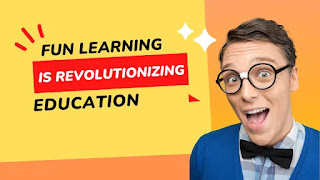In many respects, fun learning has revolutionized education. Traditional teaching techniques frequently focus on rote memorization and passive learning, which might result in disengagement and poor knowledge retention. On the other hand, incorporating entertaining and interactive components into the learning process is extremely beneficial in increasing student engagement, motivation, and information retention. Here are some examples of how enjoyable learning has revolutionized education:
Increased Engagement: Learning approaches like gamification, interactive multimedia, and hands-on activities capture students' attention and make learning fun. Engaged students are more inclined to participate actively, ask questions, and investigate issues further.
Improved Retention: Fun learning frequently involves practical application and active problem-solving, allowing students to apply theoretical information in real-world circumstances. This method improves retention because students comprehend and recall topics better when they can link them to their personal experiences.
Fun learning enables kids to think critically, analyze knowledge, and solve issues imaginatively. Games, riddles, and interactive activities frequently force pupils to think outside the box, encouraging creativity and inventive thinking abilities.
Personalized Learning: Fun learning techniques frequently provide personalized experiences that respond to the requirements and interests of individual students. Platforms based on technology may adjust to students' ability levels and give customized information, allowing each learner to grow at their speed.
Collaboration and Social Skills: Many enjoyable learning approaches encourage student collaboration and teamwork. Group activities, role-playing situations, and interactive games promote communication, cooperation, and the development of social skills, all of which are necessary for future professional success.
Positive Emotional Connection: Having fun while studying fosters a positive emotional connection with the content. When students enjoy the process of learning, they acquire a good attitude toward education, which can lead to greater motivation, curiosity, and a lifetime love of learning.
Fun learning frequently includes numerous senses, such as sight, hearing, touch, and movement. This multisensory technique improves information processing and memory formation, producing more powerful and meaningful learning.
Continuous Assessment and Feedback: Fun learning systems frequently feature instant feedback and evaluations, allowing students to track their progress and find areas for growth. This feedback loop assists students in recognizing their strengths and limitations, allowing them to better comprehend the subject matter.
Fun learning approaches may be tailored to diverse learning styles, making education more inclusive and accessible to all students. Fun learning accommodates individual preferences and promotes unique learning demands by giving many approaches to and engagement with the content.
Fun learning fosters a lifelong learning mentality by developing curiosity, self-motivation, and a spirit of exploration. Students who love the learning experience are more inclined to pursue information outside the classroom and throughout their lives.
Fun learning frequently emphasizes the application of information to real-world circumstances, bridging the gap between academic notions and practice. It helps students grasp the value and significance of their education by displaying the real-world application of what they are studying.
Curiosity and Exploration: Fun learning encourages kids to be interested, to ask questions, and to investigate things outside of the set curriculum. It instills a feeling of surprise and discovery in kids, encouraging them to explore deeper subjects and seek autonomous study.
Personal Development and Self-Efficacy: When students participate in pleasurable and difficult learning activities, they feel a feeling of accomplishment and personal development. Fun learning settings foster self-efficacy by allowing students to establish objectives, overcome challenges, and gain confidence in their skills.
Worldwide Cooperation and Cultural Understanding: Technology has made cooperation and cultural exchange possible in enjoyable learning settings. Students may communicate with students from other nations, share ideas, and collaborate on projects. This promotes cultural awareness, empathy, and global citizenship.
Adaptability to a Changing Educational Landscape: Fun learning approaches frequently use technology and digital resources that can be readily updated and changed to a fast-changing educational landscape. It enables instructors to keep up with expanding teaching approaches using new technology, online materials, and interactive platforms.
Positive Value Reinforcement: Fun learning may be structured to promote positive values and ethical behavior. Students learn empathy, respect, teamwork, and other critical social and emotional skills via storytelling, role-playing, and character development.
Overcoming studying obstacles: Having fun while studying can aid in removing learning obstacles such as learning disorders or difficulty in specific courses. It accommodates diverse learning styles and gives alternate avenues to comprehension by presenting information in entertaining and interactive ways.
Career Readiness and 21st-Century Competencies: The emphasis of fun learning is on developing 21st-century skills such as critical thinking, problem-solving, communication, teamwork, and digital literacy. By incorporating these abilities into the learning process, students are better prepared to meet the demands of the modern workforce.
Building Teacher-Student ties: Fun learning creates better ties between instructors and students. When teachers add engaging and participatory activities into their classes, they establish a pleasant classroom climate and foster trust and rapport.
Parental Involvement: Exciting learning frequently goes outside the classroom to include parents or carers. Parents may actively engage in their child's learning journey and reinforce concepts taught in school through interactive homework assignments, family projects, and educational activities.
Fun learning systems frequently feature adaptive technology that may deliver personalized feedback depending on each student's performance and learning trajectory. This rapid feedback assists students in understanding their strengths and limitations, allowing them to concentrate on areas that require improvement.
Gamification of Learning: Gamification incorporates game design features into the learning process, such as competition, prizes, and challenges. Making studying feel like a game boosts motivation and engagement while encouraging students to actively participate and strive for better.
Mixed Learning Techniques: By using mixed learning techniques, fun learning supplements regular classroom training. It mixes online materials, interactive activities, and face-to-face instruction to create a flexible and dynamic learning environment that accommodates a variety of learning styles.
Educators' Professional Development: Fun learning has also transformed professional development possibilities for educators. Teachers may learn about creative and engaging teaching practices that improve student learning outcomes by using online platforms, attending seminars, and collaborating with other educators.





0 Comments